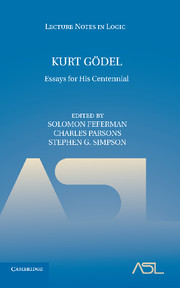On the question of absolute undecidability
Published online by Cambridge University Press: 04 August 2010
Summary
The incompleteness theorems show that for every sufficiently strong consistent formal system of mathematics there are mathematical statements undecided relative to the system. A natural and intriguing question is whether there are mathematical statements that are in some sense absolutely undecidable, that is, undecidable relative to any set of axioms that are justified. Gödel was quick to point out that his original incompleteness theorems did not produce instances of absolute undecidability and hence did not undermine Hilbert's conviction that for every precisely formulated mathematical question there is a definite and discoverable answer. However, in his subsequent work in set theory, Gödel uncovered what he initially regarded as a plausible candidate for an absolutely undecidable statement. Furthermore, he expressed the hope that one might actually prove this. Eventually he came to reject this view and, moving to the other extreme, expressed the hope that there might be a generalized completeness theorem according to which there are no absolutely undecidable sentences.
In this paper I would like to bring the question of absolute undecidability into sharper relief by bringing results in contemporary set theory to bear on it. The question is intimately connected with the nature of reason and the justification of new axioms and this is why it seems elusive and difficult. It is much easier to show that a statement is not absolutely undecidable than to show either that a statement is absolutely undecidable or that there are no absolutely undecidable statements.
- Type
- Chapter
- Information
- Kurt GödelEssays for his Centennial, pp. 189 - 226Publisher: Cambridge University PressPrint publication year: 2010
- 7
- Cited by

